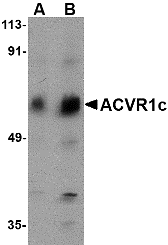ACVR1C Antibody
| Code | Size | Price |
|---|
| PSI-4795-0.02mg | 0.02mg | £150.00 |
Quantity:
| PSI-4795-0.1mg | 0.1mg | £449.00 |
Quantity:
Prices exclude any Taxes / VAT
Overview
Host Type: Rabbit
Antibody Isotype: IgG
Antibody Clonality: Polyclonal
Regulatory Status: RUO
Applications:
- Enzyme-Linked Immunosorbent Assay (ELISA)
- Western Blot (WB)
Images
Documents
Further Information
Additional Names:
ACVR1C Antibody: FOP, ALK2, SKR1, TSRI, ACTRI, ACVR1A, ACVRLK2, Activin receptor type-1, Activin receptor type I, ACTR-I
Application Note:
ACVR1C antibody can be used for detection of ACVR1C by Western blot at 1 and 2 μg/mL.
Antibody validated: Western Blot in human samples. All other applications and species not yet tested.
Antibody validated: Western Blot in human samples. All other applications and species not yet tested.
Background:
ACVR1C Antibody: Activins are dimeric growth and differentiation factors which belong to the transforming growth factor-beta (TGF-beta) superfamily of structurally related signaling proteins. Activins signal through a heteromeric complex of receptor serine kinases which include at least two type I and two type II receptors. ACVR1C, also known as ALK7, is a type I activin receptor and plays a role in cell differentiation, growth arrest and apoptosis. ACVR1C can mediate signaling by ligans such as Nodal, GDF-1/3, activin B and activin AB, all of which can also signal through the ubiquitous activin type I receptor ACVR1B (also known as ALK4). ACVR1C is a novel marker specifically expressed during the late phase of adipocyte differentiation. ACVR1C is dispensable for mouse embryogenesis, which suggests alternative functions for this receptor in postnatal development and tissue homeostasis. ACVR1C plays an important role in regulating the functional plasticity of pancreatic islets, negatively affecting beta-cell function by mediating the effects of activin B on Ca2+ signaling.
Background References:
- Tsuchida K, Sawchenko PE, Nishikawa S, et al. Molecular cloning of a novel type I receptor serine/threonine kinase for the TGF beta superfamily from rat brain. Mol. Cell. Neurosci.1996; 7:467-78.
- Reissmann E, Jornvall H, Blokzijl A, et al. The orphan receptor ALK7 and the activin receptor ALK4 mediate signaling by nodal proteins during vertebrate development. Genes Dev.2001; 15:2010-22.
- Tsuchida K, Nakatani M, Yamakawa N, et al. Activin isoforms signal through type I receptor serine/threonine kinase ALK7. Mol. Cell Endocrinol.2004; 220:59-65.
- Kogame M, Matsuo S, Nakatani M, et al. ALK7 is a novel marker for adipocyte differentiation. J. Med. Invest.2006; 53:238-45.
Buffer:
ACVR1C Antibody is supplied in PBS containing 0.02% sodium azide.
Concentration:
1 mg/mL
Conjugate:
Unconjugated
DISCLAIMER:
Optimal dilutions/concentrations should be determined by the end user. The information provided is a guideline for product use. This product is for research use only.
Immunogen:
ACVR1C antibody was raised against a 15 amino acid synthetic peptide near the amino terminus of the human ACVR1C.
The immunogen is located within amino acids 130 - 180 of ACVR1C.
The immunogen is located within amino acids 130 - 180 of ACVR1C.
NCBI Gene ID #:
90
NCBI Official Name:
activin A receptor, type I
NCBI Official Symbol:
ACVR1
NCBI Organism:
Homo sapiens
Physical State:
Liquid
Protein Accession #:
Q8NER5
Protein GI Number:
4501895
Purification:
ACVR1C Antibody is affinity chromatography purified via peptide column.
Research Area:
Signal Transduction
SPECIFICITY:
This antibody is predicted to have no cross-reactivity to ACVR1 or ACVR1B.
Swissprot #:
Q04771
User NOte:
Optimal dilutions for each application to be determined by the researcher.
Related Products
| Product Name | Product Code | Supplier | ACVR1C Peptide | PSI-4795P | ProSci | Summary Details | |||||||||||||||||||||||||||||||||||||||||||||||||||||||||||||||||||||||||||||||||||||||||||||
|---|---|---|---|---|---|---|---|---|---|---|---|---|---|---|---|---|---|---|---|---|---|---|---|---|---|---|---|---|---|---|---|---|---|---|---|---|---|---|---|---|---|---|---|---|---|---|---|---|---|---|---|---|---|---|---|---|---|---|---|---|---|---|---|---|---|---|---|---|---|---|---|---|---|---|---|---|---|---|---|---|---|---|---|---|---|---|---|---|---|---|---|---|---|---|---|---|---|---|---|



